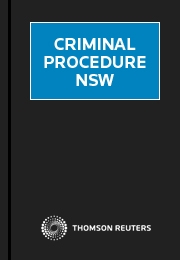Latest updates to Criminal Procedure (NSW)
Key updates include:
The requirement to specify offences relied upon when exercising a power: [7.450], [9.53]
Police exercising their powers to search and to issue penalty notices must specify the particular offences upon which these powers are being exercised.
Appeal courts have referred again to the policy behind these requirements set out in Smethurst v Commissioner of Police (Cth) [2020] HCA 14; (2020) 272 CLR 177.
That case has been relied upon recently:
• in relation to the issue of search warrants: the warrant must set “real and meaningful parameters …. on the scope of the search that is authorised”: Hartley v Commissioner of the Australian Federal Police [2023] FCA 368; and
• in relation to penalty notices: the notice must make clear “the penalty notice offence specified in the notice”: Fines Act 1996 (NSW) s 20; Re Beame (2023) 297 A Crim R 131; [2023] NSWSC 347. The penalty notice must not leave the recipient guessing as to the offence: Beame at [119] per Yehia J: "In the proceedings before me, the short description identifying the offence was, in each case, insufficient to meet the requirements of s 20 of the Fines Act. As a minimum requirement, the offence-creating provision should have been included on the penalty notice in order to comply with s 20."
The cases in Beame dealt with fines issued in 2021 during Covid lockdowns. The court noted that “32,648 notices, in the same form as that received by Mr Beame, have been issued, totalling approximately $33 million in fines”: Beame at [32].
Demeanour in the dock: [21.860]
Demeanour of an accused in the dock or while giving evidence can affect the assessment of their credibility. A judicial officer must give the parties the opportunity to make submissions if he or she notices anything affecting credit: Gardiner v The King [2023] NSWCCA 89. It was wrong for a judge in a judge-alone trial to state that the accused’s demeanour in both the witness box and the dock led to a conclusion undermining their credit without having previously raised whatever it was that attracted their attention during the trial.
The principles behind the grant of a permanent stay: [17.2580]
The principles behind the grant of a permanent stay were recently summarised by Chief Justice: La Rocca v The King [2023] NSWCCA 45 at [34].
Progress towards raising the age of criminal responsibility in the ACT, NT and Victoria: [13.920]
A detailed summary of this release is available at [S23.20].

Criminal Procedure (NSW) provides in-depth practical and procedural knowledge on how to approach your criminal case in New South Wales, from the moment of arrest to appealing a sentence decision (including remedies if no conviction results). Topics discussed in the service are: arrest, charging, bail, detention and questioning, search warrants, telephone interception and surveillance devices, pre- and post-arrest directions and searches, identification material, taking and using body samples, body cavity searches, mentally ill / intellectually disabled persons, summary procedure, committal procedure, pre-hearing procedure, hearings (conduct of defence / conduct of prosecution / witnesses / role of judges and magistrates / jury and verdicts), sentencing and appeals.
